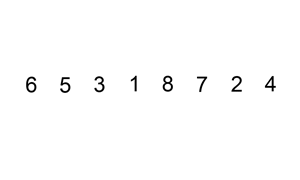Insertion Sort is the simplest sorting algorithm which sorts the array by shifting elements one by one.
It works the way we sort playing cards in our hands.
Characteristics:
It works the way we sort playing cards in our hands.
Characteristics:
- Simple implementation.
- Efficient for (quite) small data sets.
- More efficient in practice than most other simple quadratic (i.e., O(n*n)) algorithms such as selection sort or bubble sort.
- Stable; i.e., does not change the relative order of elements with equal keys.
- In-place; i.e., only requires a constant amount O(1) of additional memory space.
EXAMPLE
[Reference: wikipedia]
INSERTION SORT C-CODE
// C program to implement Insertion sort#include <stdio.h>
int main()
{
int arr[] = {6, 3, 5, 2, 8, 10, 9};
int n = sizeof(arr)/sizeof(arr[0]);
int i, j, key;
//Insertion Sort starts
for (i = 1; i < n-1; i++)
{
key=arr[i];
for (j = i - 1; j >= 0 && arr[j] > key; j--)
{
a[j + 1] = arr[j];
}
arr[j + 1] = key;
}
//Insertion Sort ends
printf("Sorted array: \n");
for (int i=0; i < n; i++)
{
printf("%d ", arr[i]);
}
return 0;
}
COMPLEXITY ANALYSIS
- Worst and Average Case Time Complexity: O(n*n). Worst case occurs when array is reverse sorted.
- Best Case Time Complexity: O(n). Best case occurs when array is already sorted.
- Auxiliary Space Complexity: O(1). Only single extra memory space is required for "key" variable.



